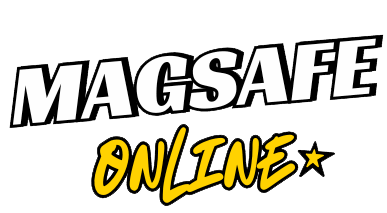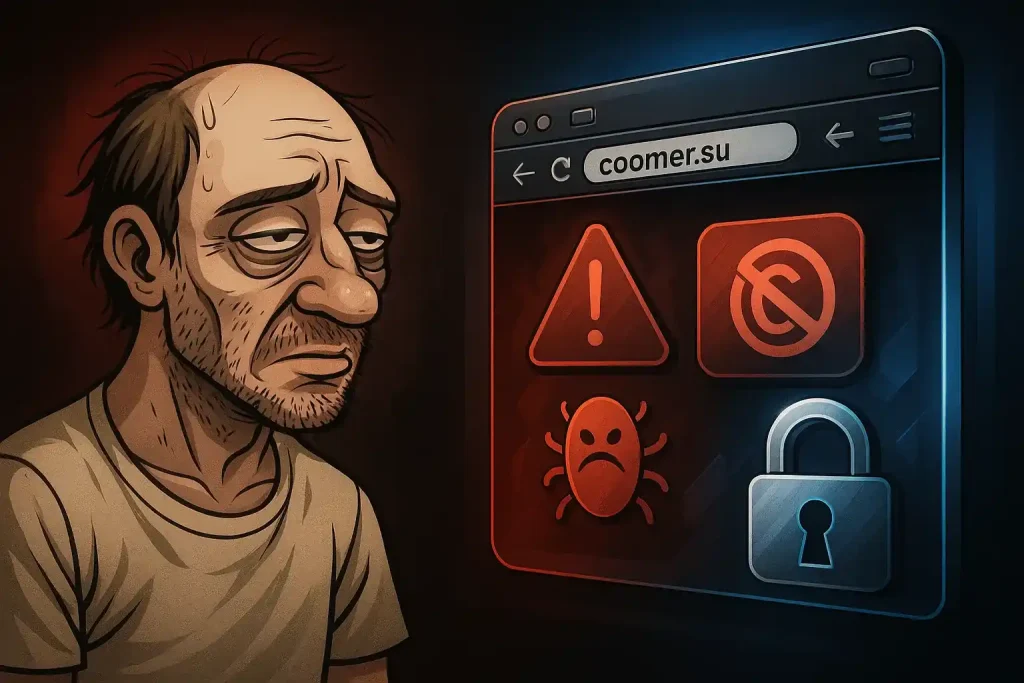Introduction
In today’s digital landscape, the line between entertainment, privacy, and cybersecurity is blurrier than ever. One domain that’s been sparking discussions among online communities and cybersecurity experts alike is Coomer.su. Labeled by Malwarebytes as riskware, this website has gained notoriety for being a platform that hosts adult and user-generated content — yet its connections with malicious files and unsafe behavior have made it a red flag in the cybersecurity community.
This article takes a deep dive into what Coomer.su is, why it’s considered dangerous, how riskware operates, and what users can do to stay protected online.
1. What Is Coomer.su?
Coomer.su is a website that gained traction as a mirror and archival platform for explicit content, often sourced from creators on platforms like OnlyFans and Patreon. While it might appear as a simple content-sharing website, its operations have drawn significant scrutiny.
According to Malwarebytes Labs, Coomer.su has been blocked by default in their security tools. The reason? It’s associated with riskware, which refers to potentially unwanted or unsafe software, scripts, or behaviors that can compromise users’ systems.
While the website itself isn’t necessarily a “virus,” its nature — hosting and distributing user-generated files and explicit content — creates an environment ripe for abuse by cybercriminals. Malwarebytes warns that attackers have used such domains to upload infected images, disguised executables, or malicious advertisements.
2. What Is Riskware?
The classification of Coomer.su as “riskware” doesn’t mean it’s an active virus. Rather, it suggests that the site poses a potential security risk due to how it operates or what it hosts.
Riskware is a broad cybersecurity term encompassing tools or platforms that may not be inherently harmful but can be exploited. Examples include:
- File-sharing platforms used to spread malware.
- Adult content sites that serve malicious ads.
- Websites that require unnecessary permissions.
- Browser scripts that track or mine cryptocurrency.
In the case of Coomer.su, the combination of explicit content, unverified uploads, and user-driven interactions increases the attack surface — meaning bad actors can easily target unsuspecting users with malware, phishing links, or data-harvesting scripts.
3. Why Malwarebytes Blocks Coomer.su
Malwarebytes maintains a Threat Center that categorizes domains based on reputation, behavior, and potential harm. When it flags a domain like Coomer.su, several factors are likely at play:
a) Untrusted Content Sources
Coomer.su hosts and mirrors content from creators without strict moderation or verification. This makes it easy for malicious users to embed hidden malware or trojan links within images, compressed files, or comment sections.
b) Exploitative Advertising Networks
Many adult and pirated content sites rely on third-party ads to generate revenue. Unfortunately, such ad networks are notoriously insecure, often leading users to phishing pages or automatic downloads of infected software.
c) Privacy Violations
Coomer.su’s purpose — reposting and archiving creators’ content — also raises ethical and privacy concerns. Some cybersecurity experts argue that such sites indirectly contribute to the exploitation of digital privacy, making them even less trustworthy.
d) Prior Infection Reports
Security vendors like Malwarebytes often use user reports and telemetry data. If a number of Malwarebytes users encounter malicious payloads or suspicious scripts from Coomer.su, it triggers an automatic classification as a risky domain.
4. The Technical Side: How Coomer.su Can Pose Threats
Even without direct malware, a site can be dangerous. Here’s how Coomer.su might expose users to risk:
4.1 Drive-by Downloads
These occur when simply visiting a site starts an automatic file download — sometimes invisible to the user. If the site serves infected code, the download could install spyware, keyloggers, or adware.
4.2 Malicious Redirects
Certain pages or ads may redirect users to external sites that steal login credentials or push fake browser updates. Such tricks are common on adult and file-sharing sites.
4.3 Browser Exploits
Hackers can exploit browser vulnerabilities through embedded scripts. Visiting a compromised Coomer.su page could expose users to a remote-code execution attack or inject cryptomining scripts.
4.4 Phishing Through Pop-ups
Adult sites often use aggressive pop-ups or fake login prompts (“verify your age,” “confirm subscription”). These can be phishing traps collecting sensitive data.
5. Ethical and Legal Implications
Coomer.su operates in a gray zone between legality and violation. While hosting adult content isn’t inherently illegal, the website’s model often involves reposting paid or private content without consent.
That leads to multiple issues:
- Copyright infringement: Re-uploading creators’ paid content violates intellectual property laws.
- Privacy breaches: Many creators report their private or subscriber-only material being distributed without authorization.
- Monetization through stolen content: Even if not directly profiting, the platform gains traffic and potential ad revenue from redistributed material.
From a cybersecurity perspective, this gray legality amplifies risk — because such sites operate outside regulatory scrutiny, making them prime zones for malware injection and scams.
6. Coomer.su in the Broader Cybersecurity Landscape
Coomer.su isn’t alone. Numerous similar domains pop up, especially on the .su, .ru, and .to domains, which are less regulated and often host mirror sites for adult or pirated content.
For cybersecurity firms, domains like Coomer.su illustrate how riskware overlaps with digital ethics. Blocking such sites isn’t just about preventing malware — it’s about discouraging unsafe behaviors and privacy violations online.
Moreover, blocking riskware sites helps prevent secondary infections, such as when a user’s computer becomes part of a botnet or starts leaking credentials via browser cookies.
7. How Users Can Stay Safe
Whether or not someone chooses to visit adult content websites, practicing digital hygiene is essential. Here are safety measures recommended by cybersecurity professionals:
- Use Reliable Antivirus and Browser Protection
Tools like Malwarebytes, Bitdefender, or Windows Defender can intercept suspicious scripts and warn about dangerous sites. - Avoid Downloading Files from Unknown Sources
Never open ZIPs, EXEs, or images from unverified mirrors. - Use a VPN
A VPN masks your identity, adds encryption, and helps avoid tracking from ad networks. - Disable Pop-ups and JavaScript on Unknown Sites
This limits the potential of hidden scripts exploiting browser vulnerabilities. - Practice Ethical Browsing
Respect creators’ privacy by supporting official content sources rather than unauthorized archives.
8. Can You Whitelist Coomer.su in Malwarebytes?
Technically, yes — but it’s strongly discouraged. Malwarebytes includes an Allow List feature where users can manually exclude certain sites.
To do this, one would:
- Open Malwarebytes → Detection History → Allow List.
- Click “Add” → “Allow a website” → enter the URL (e.g., coomer.su).
However, the company explicitly warns that this bypass should only be used if the domain is trusted — and Coomer.su is not. Doing so opens users up to potential infections or data theft.
9. The Reputation of Coomer.su Across the Web
When cross-checking Coomer.su’s reputation across other platforms, a consistent pattern emerges:
- VirusTotal reports multiple warnings for risky content and potentially unwanted downloads.
- Google Safe Browsing has, at times, flagged similar domains for phishing or malware distribution.
- Web of Trust (WOT) and ScamAdviser score Coomer.su poorly in terms of safety and trustworthiness.
The consensus across the cybersecurity ecosystem is clear — Coomer.su should be avoided for both security and ethical reasons.
10. The Human Side: Why People Still Visit Risky Sites
Despite all warnings, millions continue to visit such domains. The reasons often blend curiosity, convenience, or anonymity. For some, Coomer.su offers free access to paid content — but that “free” access can cost them far more in privacy or device security.
This phenomenon reflects a broader issue: people underestimate digital risk when immediate gratification is involved. Just as users click suspicious links promising free games or gift cards, adult content often becomes a vehicle for exploitation.
11. The Future of Riskware and Domain Blocking
Cybersecurity firms are increasingly relying on AI-driven threat detection to identify risky sites like Coomer.su earlier. By analyzing domain behavior, network patterns, and shared hosting infrastructure, they can predict when a new clone or mirror site appears.
In the future, tools like Malwarebytes will likely:
- Use behavioral analytics to auto-flag emerging riskware.
- Employ DNS-level blocking to prevent users from even connecting to harmful domains.
- Integrate privacy reporting to alert users about data collection and tracking by adult or mirror sites.
12. Summary: What Coomer.su Teaches Us
Coomer.su is a textbook case in how digital risk, privacy ethics, and user behavior intersect. It may not spread viruses directly, but by hosting unverified content and fostering unsafe sharing, it opens countless doors for abuse.
It teaches us:
- Free content isn’t always safe content.
- Even seemingly benign websites can harbor malicious elements.
- Privacy violations often walk hand-in-hand with cybersecurity risks.
In essence, Coomer.su is a reminder that online safety starts with personal responsibility.
Conclusion
The internet offers limitless information and entertainment — but also endless opportunities for exploitation. Coomer.su, though perhaps initially appearing as just another content hub, embodies many of the hidden dangers lurking in our digital lives.
From riskware classification to privacy violations, the site underscores why tools like Malwarebytes exist — to draw a line between curiosity and caution. Whether for cybersecurity or ethical reasons, avoiding domains like Coomer.su is not about restriction; it’s about empowerment through awareness.
So next time a site offers something “too good to be true,” remember: safety online is never accidental — it’s intentional.
FAQs
1. What is Coomer.su used for?
Coomer.su is an adult content mirror site where users can view or share explicit material, often reposted from creator platforms.
2. Why did Malwarebytes block Coomer.su?
Because the site is associated with riskware — hosting potentially unsafe content, malicious ads, or scripts.
3. Is visiting Coomer.su illegal?
Not necessarily, but it may involve accessing copyrighted or private content, which can lead to legal and ethical issues.
4. Can I safely whitelist Coomer.su in my antivirus?
While possible, it’s not recommended. Doing so may expose your device to malware or data theft.
5. How can I protect myself from similar sites?
Use antivirus protection, avoid downloading from unknown sources, and respect privacy by supporting legitimate creator platforms.

